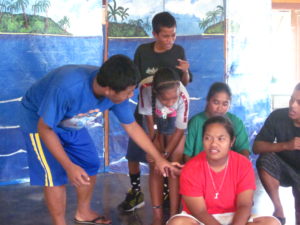Stay Out of the Improvised Way
July 23, 2015
In the first days of the program, the students listen with a kind of quizzical, blank look. When they stand to answer a question or introduce themselves—wait, strike that—IF they stand and IF they answer and IF you can hear them, the words are laced with embarrassed giggles and quick looks about the room to see who might be laughing at them. The words tumble out as fast and briefly as possible so the pained individual can sit back down as quickly as possible to wishfully disappear from sight.
All of this belies the possibilities lurking inside.
In the subsequent days, the drama begins, on multiple levels. As we start to imagine and construct basic storylines for the plays we will devise, there also exists a kind of negotiation: Who will step up into what roles? Who is immediately ready to take on the risk of creating the drama and who is going to hang back and spend more time just watching to see if this is what they really want to do.
In these early stages we lose a few. In these early days shyness, that comfortable, crusty old shell, begins to crack on others. Somewhere deep inside most of these youth, excitement grabs ahold of them and they feel, if not identify, the possibilities inherent within these plays they are now creating. Possibilities for fun, for camaraderie, for potential self-transformation.
Inevitably some of them trade off roles and responsibilities. They young boy that looks the part of a character who should be falling in love for the first time, isn’t comfortable with girls yet. And one of his group members, who looks older so was naturally cast as the teacher, exudes more confidence but is stuck in a small role. So they switch. No big deal that the teacher looks like a pre-teen. We go with it. And the trade-off feeds confidence.
As the action of the dramas feed dialog, the students’ find their voices. A few dive in with great gusto, inspiring others to grow into their roles. More dialog, more action.
Here’s where I start to get out of the way. I encourage and challenge them to trust themselves, their partners and always, always, always ask for more. But I don’t get in the way of deciding what that more is.
We devise. We rehearse. We encourage and we triumph choices.
And when it is time to be in front of an audience, these young, once-shy teens rip into performance with a vengeance. I encourage them to continue to devise, to improvise, to listen to their audience. And so many of them are so good at that. A kind of muse moves them and the stage is filled with unexpected choices and focus that electrifies the audience in a joyful way. Maybe I have to remind them to keep the story in mind sometimes, but I am more enthused by their ability to trust themselves, to ‘go with the flow’ so to speak and let scenes ebb and flow in size as their audience rewards them with intense focus and gales of laughter. Even the occasional rain doesn’t deter the outside audience from attending.
I could be more precise in directing their choices, but it is more impactful for me to encourage their instincts. After all, they know their audience. And I know the power of getting out of the way of that.
